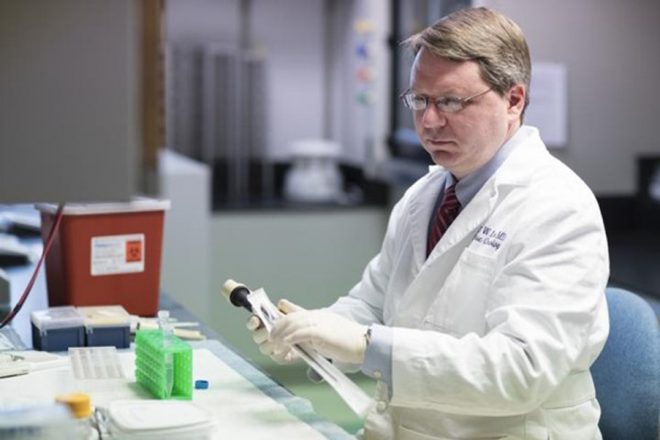Stem cell transplants prevent relapses of most common childhood cancer

Children and young adults who receive CAR T-cell therapy for the most common childhood cancer – acute lymphoblastic leukemia – suffer remarkably fewer relapses and are far more likely to survive when the treatment is paired with a subsequent stem cell transplant, a new study finds.
The research, with an average follow up of nearly five years, suggests that stem cell transplants offer long-term benefits for young patients who receive the cutting-edge immunotherapy. CAR T-cell therapy results in complete remission in 60%-100% of patients initially, but the relapse rate is high. However, among those who received a stem cell transplant after CARs, the relapse rate was less than 10% two years later.
“More than 50% of kids in other studies with a different CAR relapse, with the majority of them losing the target the CAR goes after,” said researcher Daniel “Trey” Lee, MD, a pediatric oncologist and Director of Pediatric Stem Cell Transplant and Immunotherapy at UVA Children’s and the UVA Cancer Center. “Most of these kids have a single shot at this life-saving and paradigm-changing therapy called CAR T-cells. We should do all we can to maximize the chance for a cure, and right now that means a transplant after CAR therapy for most.”
About CAR T-Cell Therapy
Chimeric antigen receptor (CAR) T-cell therapy takes a person’s own immune cells and genetically modifies them to make them more effective cancer killers.
The approach has shown high remission rates – up to 100% – 28 days after it is given to children and young adults with B-cell acute lymphoblastic leukemia. But a significant number relapse, the limited data available suggests. One study found that more than 40% had relapsed 13.1 months later.
To determine if stem cell transplants could help, the new study looked at outcomes in 50 children and young adults, ages 4 to 30. The median age was 13.5 years.
Among the 21 who received an allogenic stem cell transplant after CARs, only 9.5% had relapsed 24 months later. In comparison, all of those who did not receive a stem-cell transplant had relapsed.
“Even as impactful as CAR T-cell therapy is for children with relapsed leukemia, we now know that the best outcomes happen when the child undergoes a stem cell transplant afterwards,” Lee said. “Many parents turn to CAR T-cells to possibly avoid a stem cell transplant, and that is entirely understandable. But there is a window of opportunity after CARs to cure more of these incurable kids with a transplant; our study demonstrates this.” His hope for the future is for the field to be able to distinguish up front those who need a transplant and those who do not.
UVA Children’s and the UVA Cancer Center offer several types of CAR T-cell therapies for both children and adults with leukemia and lymphoma.
Findings Published
The researchers have published their findings in the Journal of Clinical Oncology.
IMAGE: DANIEL “TREY ” LEE, MD, IS CONDUCTING PIONEERING CLINICAL RESEARCH IN THE BATTLE AGAINST CHILDHOOD CANCER. LEE IS A PEDIATRIC ONCOLOGIST AND DIRECTOR OF PEDIATRIC STEM CELL TRANSPLANT AND IMMUNOTHERAPY AT… view more
CREDIT: DAN ADDISON | UVA COMMUNICATIONS





